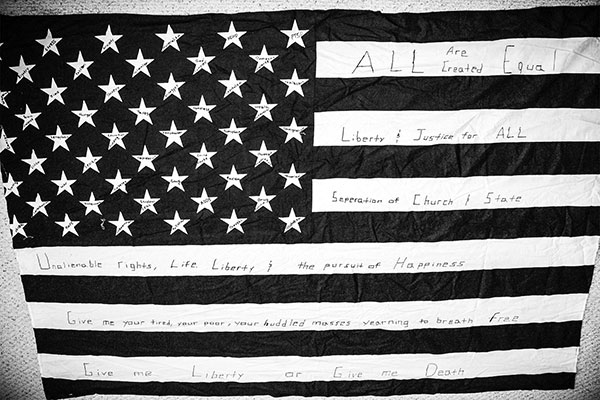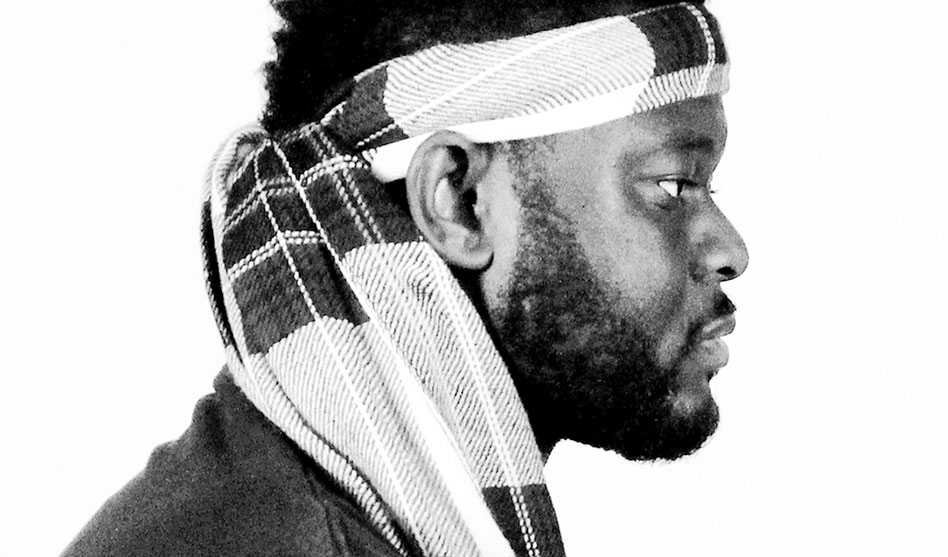 When I first met Thomas Massaquoi, I immediately noticed that he had a calming artist vibe reverberating about him. He was wearing a shirt that was hand-painted with words like “dope,” “hope” and “resist” that he had made himself. I immediately resonated with and admired that he was the kind of artist who literally walked his art, wore his art and, as I would soon come to learn, is his art.
When I first met Thomas Massaquoi, I immediately noticed that he had a calming artist vibe reverberating about him. He was wearing a shirt that was hand-painted with words like “dope,” “hope” and “resist” that he had made himself. I immediately resonated with and admired that he was the kind of artist who literally walked his art, wore his art and, as I would soon come to learn, is his art.
Because whether Thomas is taking photographs, writing poetry, penning scripts, making movies, making clothes or dreaming up a panelist-lead series in hopes of creating dialogue and change in our community, his aesthetic — his vibe — is ever-present.
What is that vibe? It begins and ends with his core love and value of philosophy, a field, he told me, that “wasn’t on my radar in college, but after taking a few classes and speaking to an adjunct from SMU, he convinced me to major in philosophy.”
Now, philosophy is deeply woven into all his work, and it is THE space in which Thomas resides.
One of my favorites of his works is American Philosopher, a short video he wrote and co-created with Jake Fordyce that is posted on his website. In it, we see Thomas in the middle of a field of grass, reading, reflecting and visually mirroring the vibe of his narration. It is a spoken-word piece that sounds like his life and artist manifesto.
But while all his works are grounded in philosophy, they are also brimming with visionary ideals rooted in action and bound for change — change to ourselves and to the world.
“Who am I?” his video asks. “My connection is with those who dare to challenge.”
And challenge us to question and change ourselves for the highest good of all is exactly what his body of work asks us to do, to push ourselves beyond our normal comfort zones.
I’m thinking specifically here of of AmeriKa, a work that uses the American flag as its canvas. In a country full of one-dimensional beliefs about patriotism where some vilify anyone or anything they deem disrespectful to the flag — whether that’s kneeling during the national anthem, burning the flag or turning it upside-down in protest — a work that incorporates written words like “AIDS” “Slavery” and “Give me liberty or give me death” written on the Stars and Stripes challenges us right then and there to define what patriotism means for us as individuals. It forces us to put a stake in our own proverbial ideological ground and claim, “This is what I believe and why.”

AmeriKa
Or it prompts us to ask ourselves an even more important question: “Can American patriotism really be singularly defined by how one treats its symbol (the flag) vs. how one treats its literal manifestation (the people)?”
But here’s what really excites me about Thomas’ work: It’s a quiet radicalism, the kind that doesn’t scream its ideals or shout its opinions in your face. Instead, it challenges us from the inside without demonizing us on the outside for making an educational choice to believe something different.
That’s because the heart that beats Thomas’ philosophy into all his work is a pulse of sameness. “My belief is that we are all the same. We are capable of doing the same, for better or worse,” he says. “And with that similarity, I know we can build something great, something better.”
And as a writer and artivist (art + activist), I, too, am drawn to “those who dare to change.” And Thomas is changemaker.
But it is also the spirit of alikeness that I identify with most within his body of work. And I believe that as much as we need people to remind us of how we are different, we also need people who remind us that, underneath all those layers of difference, is a shared sameness.
We need people — and need to be people — who honor all our differences, but also know that in the end none of it matters.
As I closed out my interview, I asked Thomas a question that I have been asking of myself and many other creatives and artists: “What is one small shift in our thinking or the way we view/go about our lives that has the potential to deeply change us?”
Thomas’ answers mirrored all the above sentiments: “Our time is finite, not infinite and guaranteed. Once your concept has been challenged or threatened, you will move through life differently.”
And to move and think differently is exactly what Thomas’ work inspires us to do.
Brandi Amara Skyy is a queer artist and activist — an artivist — who lives and works in Dallas. She writes a monthly column for Dallas Voice on queer creatives.

















Thonas’ Artivistness has been something he has always had before he even realized it. At a young age it was a sense of calm and self that at times was misunderstood for arrogance…I know as a change maker at the grassroots level he will make a tremendous difference in this world! He already has!